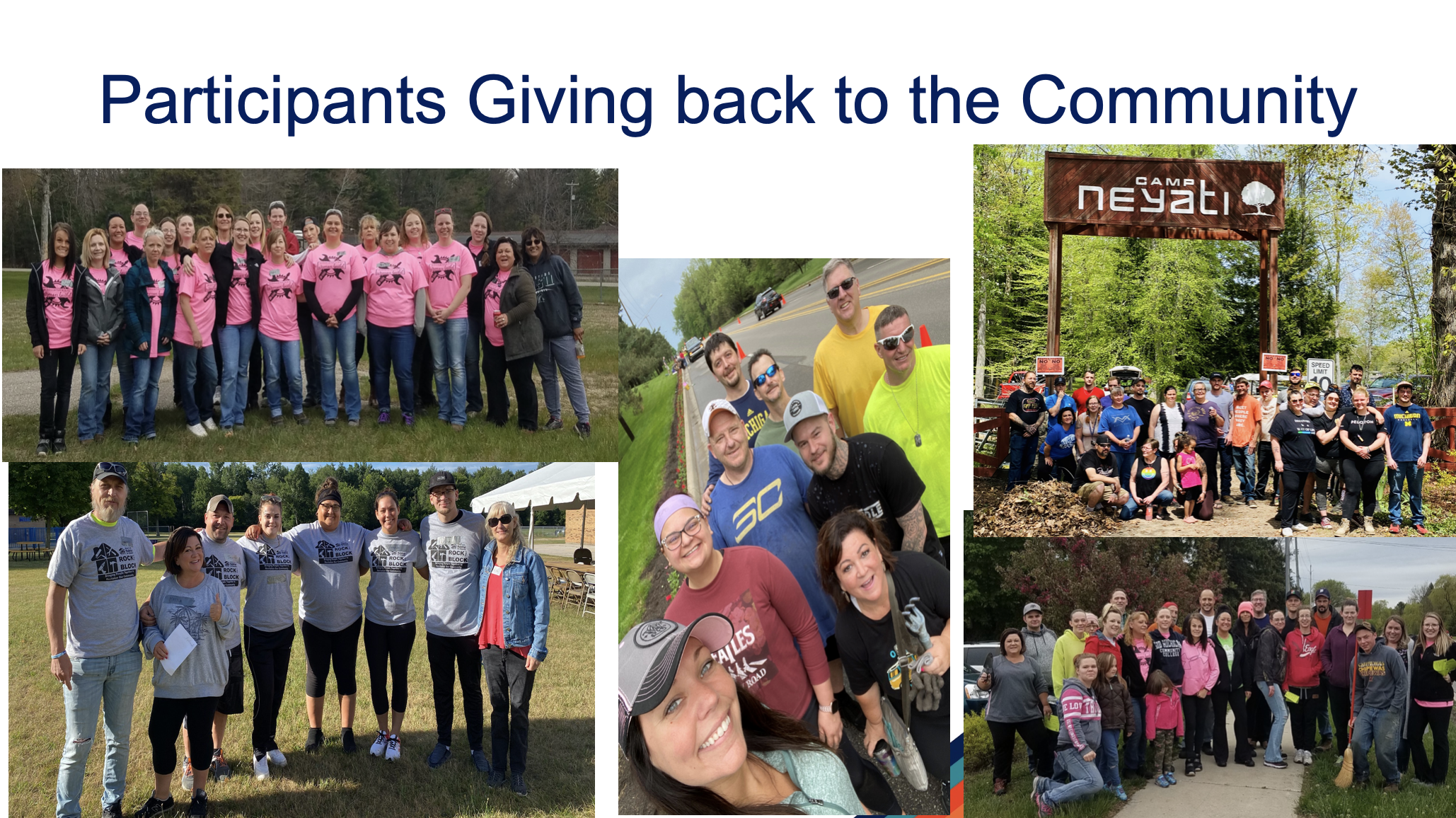Building Safety Nets: Substance Use Disorder
May 19, 2023 was the quarterly meeting for the Max Loves Midland Navigation Team. The topic was Substance Use Disorder. I'm not going to lie; it was heavy. It was heavy to hear about how many people in our community need support and are living with SUD. We had excellent guest speakers at the meeting from TEN16 Recovery Network, Midland Recovery Court, Michigan Health Improvement Alliance to discuss Andy's Place, and Midland County Department of Public Health to discuss Overdose Fatality Review. If you're unfamiliar with these organizations, read on to learn more about their vital work for Midland County.
Ten16 Recovery Network
First, we heard from Sam Price, President and CEO of Ten16 Recovery Network. He led the discussion with some staggering statistics, including the shocking fact that 1 in 10 people meet the Substance Use Disorder criteria. He explained it as a spectrum. Sam shared that it typically takes people with SUD 8 years of trying to get a full year of sobriety under their belts. Once people hit five years of sobriety, they only have a 15% chance of falling back into a disorder. That means the big question is, how do we walk alongside people for 15 years, so they can reach that threshold to be at low risk of relapsing? How can we support our neighbors and help break the cycle of addiction and shame? Sam encourages everyone to focus on prevention, but there are so many people who are already living in addiction.
According to the Michigan Department of Health and Human Services, in 2022, 62,691 people received treatment for SUD. This feels like a huge number, but it's a significant drop compared to 2019; there were 76,947 people served by the public SUD treatment system (Medicaid, Healthy Michigan Plan, and uninsured). This does not include anyone with private insurance, so it is a snapshot of current trends.
Another surprising statistic was that these numbers aren't just about opioids, heroin, and prescription drugs. Alcohol is still the number one cause of death among Michigan residents who experienced an overdose. That number is a combination of both long-term effects of chronic alcohol misuse combined with immediate events like drunk driving fatalities. Nonetheless, it is still number 1 and is grossly under-reported.
For more local details about alcohol use and income, Sam shared a page from the 2019 Midland County Health Survey with you. This page focuses on the Consequences of Alcohol Consumption. It breaks it down into several categories, including income. If a person says yes to both categories listed, they are 70% likely to have an Alcohol Use Disorder. You will notice that the upper income expressed the highest desire to cut back and had the second-highest negative consequences.
Why don't we hear more about this? Why aren't we talking about the alcohol crisis? In small group discussions, people said we might not discuss it as much because alcohol is legal, and people like it. It makes people uncomfortable to admit that something they enjoy is killing people. Another interesting statistic Sam shared was that alcohol misuse in Midland County is significant across all income levels. The use of opioids is going down, but both alcohol and methamphetamines use are on the rise.
Jessica Van Horn, the Community Engagement Manager at Ten16 Recovery Network, continued the discussion. She explained the offerings of the nonprofit to the group, which include:
- Short-term residential services.
- Detoxing.
- Getting people connected in the community and getting them involved in volunteering while they're still in recovery to help give them purpose.
- Providing transportation.
- The Center is a place people can drop in. A recovery coach staffs the front desk; both current coaches have 5+ years in recovery. It's a place to hang out if you're having a bad day. You can get lunch and be in support. There are spaces for counseling and support groups as well. Computers are available so people can job search and create resumes as well.
Jessica talked about the barriers people in recovery can face, including transportation, employment, and affordable housing, which Ten16 also helps people with. We need to make it ok to talk about the recovery process. We need to change the conversation from an inclusivity standpoint. People in recovery often struggle with shame; knowing they are not alone or supported when going through this long process is vital. Jessica also shared a Midland heat map of client services, which Ten16 uses to know where their services are needed the most, and they reference this when deciding where they need to expand services.
A joke by the late comedian Mitch Hedberg popped into my head during this discussion. He said, "Alcoholism is a disease, but it's the only one you can get yelled at for having. Dammit, Otto, you are an alcoholic. Dammit it, Otto, you have Lupus… one of those two doesn't sound right."
I think it's essential to note that Hedberg himself struggled with drugs and alcohol, ultimately dying from an overdose in 2005 at the age of 37. Substance Use Disorder is not just a matter of willpower. It is real, and it can ruin lives. People who are struggling with SUD need support, and they need people on their side.
Midland County Recovery Court
The next speaker was Amanda Hausmann, Program Coordinator for Midland County Recovery Court, through 42nd Circuit Court. Their mission is "To enhance public safety and promote personal responsibility by a collaborative judicial effort, comprehensive case management, and the rehabilitation of individuals with substance use disorders into law-abiding, healthy, and productive members of society."
Midland County Recovery Court was implemented in November of 2010 and was formerly called Drug Court. As of Apr 30, 2023: there have been 171 participants in the Midland County Recovery Court Program since its inception. There are currently 18 active participants in their four-phase program. Phase 1 focuses on stabilization and structure. Phase 2 is geared towards actualized learned skills and behaviors from phase one. Phase 3 focuses on maintenance and beginning to look at long-term goals. Phase 4 is all about maintaining sobriety and preparing for independent living. Participants must qualify to begin this program and stay a part of it.
Amanda shared several success stories from this program which included people who are now recovery coaches, people who regained custody of their children, and people living in recovery who are now thriving. Their focus is to enhance public safety and promote personal responsibility.
Michigan Health Improvement Alliance
Next, we heard from Heidi Tracy, CEO of Michigan Health Improvement Alliance. She spoke with us about possibly building a long-term sober-living community in Midland called Andy's Place. Heidy spoke passionately about how people in recovery deserve belonging and community, "They have the right to live healthy, productive lives." The proposed Andy's House would be an apartment building for sober living which creates an environment for long-term recovery success and provides support services for residents. They aim to reimagine the culture of care for people in recovery.
Midland County Department of Public Health
Finally, we heard from Catherine M Bodnar, MD, MPH, Medical Director for the Midland County Department of Public Health. We learned all about the Overdose Fatality Review. ORF continually monitors local substance use and overdose death data. From this data, they hope to increase the community's capacity to prevent future overdose deaths by leveraging resources from multiple agencies and sectors to increase system-level response.
The OFR team comprises many agencies and people, including Medical Examiner, Emergency Dept. Physician, Behavioral/Mental Healthcare Provider, Recovery Specialist/Coach, Primary Care Physician, Hospital System, Substance Use Disorder Physician, Public Health, Epidemiology, Pharmacist/Toxicologist, Family Support & Addiction Help: Families Against Narcotics (FAN), Substance Use Disorder (SUD) Prevention, Law Enforcement (City & County), Prosecutor's Office, DHHS, City Council, Probation/Parole, Courts (Drug Court), and Housing Authority.
Dr. Bodnar went in depth about Community Education, Narcan, Fentanyl point of care (POC) testing in Emergency Rooms, Referrals, and how to help reduce stigma around getting help.
Her main call to the group was to spread the word about helping make legislative changes for OFR in Michigan. She specifically referenced SB 0133, "Overdose Fatality Review Act," which would allow OFR to have regulation, powers, duties to local government entities, etc. The bill was introduced on 3/2/23. Learn more about the bill here.
Learn more about Michigan Overdose Fatality Review Here.
Learn More about Midland County Department of Public Health.
Many people in Midland call it "Sparkle City" and say people are unwilling to admit that there are problems or faults here. That is not the case in this group. Every town has issues, and we must bring them into the light. We can achieve so much more when we replace fear with the willingness to listen and help. We need to love our neighbors, even when they're struggling– scratch that, especially when they're struggling.
Join the discussion at the next Max Loves Midland Quarterly Team Meeting, Aug 18, 2023, from 9-11 am at The H Hotel Courtyard, where we will discuss Mental Health. The Navigation Team is open to all Midland County residents but requires an RSVP. If you would like to attend future Navigation Team meetings, please send me an email: hello@maxlovesmidland.com or use the contact page.
Love,
Max
Do you have a Midland County story you would like to tell that aligns with our vision?






